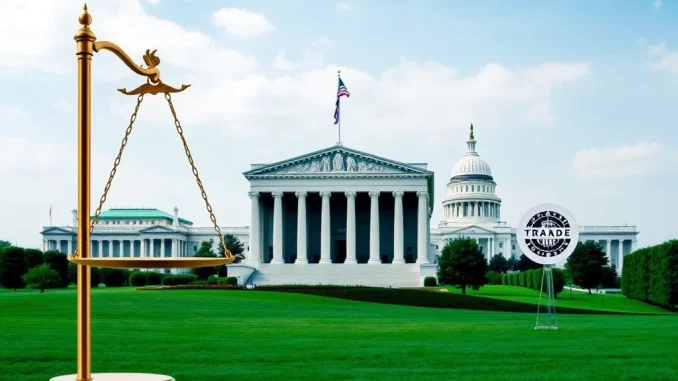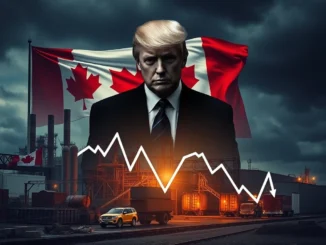
While not directly a cryptocurrency market story, significant developments in US trade policy and executive power battles can sometimes send ripples through global markets, influencing investor sentiment in unexpected ways. Today, a notable legal challenge concerning Trump tariffs has taken a new turn.
What Sparked the Federal Court Ruling?
According to reports from Reuters, the Trump administration appeal comes after a federal court ruling issued earlier today. This ruling delivered a blow to the administration by blocking the controversial “Liberation Day” tariffs.
The court’s decision was based on a specific finding: President Donald Trump was deemed to have exceeded his authority under the International Emergency Economic Powers Act (IEEPA) when he initially imposed these tariffs on April 2. IEEPA grants the President broad powers during national emergencies, but the court found that the use of this authority in this specific instance went beyond the legal limits.
Key points from the ruling and its context:
- The tariffs in question were dubbed “Liberation Day” tariffs.
- They were imposed by President Trump on April 2.
- A federal court blocked these tariffs.
- The court’s reasoning centered on the President exceeding authority under IEEPA.
Understanding IEEPA and Executive Authority
The International Emergency Economic Powers Act (IEEPA) is a United States federal law that grants the President the power to regulate international commerce after declaring a national emergency in response to any unusual and extraordinary threat, which has its source in whole or substantial part outside the United United States, to the national security, foreign policy, or economy of the United States.
Presidents have used IEEPA in various situations, often related to sanctions against foreign adversaries or blocking assets. However, its application to broad tariffs like the “Liberation Day” levies faced legal scrutiny, leading to the federal court ruling that the President’s actions went too far under the scope of this particular law.
The Significance of the Tariff Appeal
The decision by the Trump administration appeal the ruling signals a continued legal battle over the President’s power to impose tariffs, particularly under the guise of national emergency authority via IEEPA. An appeal sends the case to a higher court, which will review the lower court’s decision.
This legal challenge is important because it tests the checks and balances between the executive and judicial branches regarding trade policy. The outcome could set precedents for how future administrations can use emergency powers to implement trade measures, impacting international relations and potentially global markets.
For those monitoring economic indicators that can influence markets, including crypto, tracking such significant legal challenges to established policy mechanisms is part of understanding the broader financial landscape.
What Happens Next in the Tariff Appeal?
Now that the tariff appeal has been filed by the Trump administration, the case will proceed through the appellate court system. Both sides will present arguments regarding the interpretation of IEEPA and whether the President’s actions were within the bounds of the authority granted by the act.
There is no immediate timeline for a decision from the appellate court. The process can take several months. The outcome will determine the fate of the “Liberation Day” tariffs and provide clarity on the limits of presidential power concerning trade under emergency statutes following this specific federal court ruling.
Summary: Awaiting the Outcome
In summary, the Trump administration appeal of the federal court ruling that blocked the “Liberation Day” tariffs marks a key moment in the legal challenge over executive authority and trade policy. The court found that President Trump exceeded his powers under IEEPA, prompting the administration to seek review from a higher court. The resolution of this tariff appeal will be watched closely for its implications on presidential power and future trade actions.



